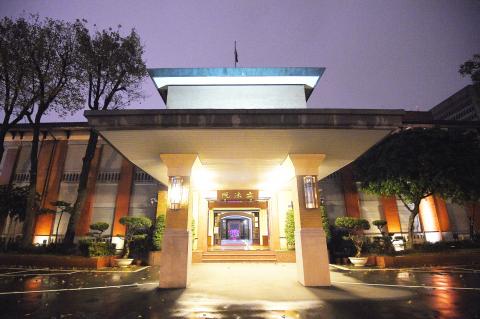The Legislative Yuan should grant cultural heritage status to its Japanese colonial-era compound, said Ling Tzung-kuei (凌宗魁), a cultural heritage expert at the National Taiwan Museum.
Since it moved to its current location in the 1960s, the Legislative Yuan has been using the compound of the former Taihoku Prefectural Second Girls’ High School, an architectural relic built in 1927 by the Japanese colonial government, to hold legislative sessions and for offices for its legislators and staff.
In the 89 years that have passed since its construction, the compound has seen many changes in its occupants, as well as its appearance.

Photo: Chen Chih-chu, Taipei Times
For example, the compound was heavily damaged by US aerial attacks during World War II. After the war, the compound was repaired and served as the office of the Taiwan Provincial Government’s agriculture and forestry division until the Legislative Yuan displaced its previous owners.
Other changes were effected. What was once the principal’s office is now the legislative speaker’s private reception room, while the sports field was paved over and converted to a parking lot.
The compound is not the only colonial girls’ school that survived. Two buildings of the four prefectural girls’ high schools in Taipei are still standing and enjoy cultural heritage status, according to the Ministry of Culture.
The site of the Taihoku Prefectural First Girls’ High School houses the Taipei First Girls’ High School, while Taipei Municipal Zhongshan Girls’ High School now occupies the former Taihoku Prefectural Third Girls’ High School. Each modern girls’ high school preserves one building from their colonial predecessors as cultural heritage sites.
However, the Legislative Yuan has refused to decide on the historical status of the compound that has served it for decades, even as legislators debate over what to do with the facilities they increasingly view as obsolete and expensive liabilities.
One issue is that the Legislative Yuan compound belongs to the Taipei City Government, which charges the legislature an annual fee of more than NT$52 million (US$1.55 million) for the privilege of leasing.
In addition, the small compound is ill-suited for the large size of the modern legislature and its staff and several petitions have been signed by legislators who said they want a more spacious and modern compound in which to conduct official business.
After the Democratic Progressive Party’s presidential and legislative electoral victories, the party’s city mayors and county commissioners proposed the relocation of national government branches, including the Legislative Yuan, outside of Taipei in the name of balanced development through a redistribution of political and economic power.
However, a lack of consensus in the desirability of relocation might have stayed the legislature’s hand in applying cultural heritage status to its compound, Ling said.
Too many proposals have been made by proponents favoring their own solutions and, as a result, no one in charge took responsibility for applying to the Ministry of Culture’s Bureau of Cultural Heritage to protect the compound, he added.
The Legislative Yuan compound is historically relevant, not only due to its age, but also its distinct architecture, which possesses a mixture of styles prevalent in the Taisho and Showa eras, including the steel-and-concrete structure and the classical brick-and-timber section facing the entrance, which is absent in other public schools built by the Japanese in Taipei, Ling said.
“Whether the legislature decides to relocate or not, the newly elected legislators should apply to make the Taihoku Prefectural Second Girls’ High School compound a historic site to highlight the importance of preserving cultural heritages,” Ling said.

Taiwan is stepping up plans to create self-sufficient supply chains for combat drones and increase foreign orders from the US to counter China’s numerical superiority, a defense official said on Saturday. Commenting on condition of anonymity, the official said the nation’s armed forces are in agreement with US Admiral Samuel Paparo’s assessment that Taiwan’s military must be prepared to turn the nation’s waters into a “hellscape” for the Chinese People’s Liberation Army (PLA). Paparo, the commander of the US Indo-Pacific Command, reiterated the concept during a Congressional hearing in Washington on Wednesday. He first coined the term in a security conference last

Prosecutors today declined to say who was questioned regarding alleged forgery on petitions to recall Democratic Progressive Party (DPP) legislators, after Chinese-language media earlier reported that members of the Chinese Nationalist Party (KMT) Youth League were brought in for questioning. The Ministry of Justice Investigation Bureau confirmed that two people had been questioned, but did not disclose any further information about the ongoing investigation. KMT Youth League members Lee Hsiao-liang (李孝亮) and Liu Szu-yin (劉思吟) — who are leading the effort to recall DPP caucus chief executive Rosalia Wu (吳思瑤) and Legislator Wu Pei-yi (吳沛憶) — both posted on Facebook saying: “I

Sung Chien-liang (宋建樑), who led efforts to recall Democratic Progressive Party (DPP) Legislator Lee Kun-cheng (李坤城), was released on bail of NT$80,000 today amid outcry over his decision to wear a Nazi armband to questioning the night before. Sung arrived at the New Taipei District Prosecutors’ Office for questioning in a recall petition forgery case last night wearing a red armband bearing a swastika, carrying a copy of Adolf Hitler’s Mein Kampf and giving a Nazi salute. Sung left the building at 1:15am without the armband and covering the book with his coat. Lee said today that this is a serious

The Ministry of Economic Affairs has fined Taobao NT$1.2 million (US$36,912) for advertisements that exceed its approved business scope, requiring the Chinese e-commerce platform to make corrections in the first half of this year or its license may be revoked. Lawmakers have called for stricter enforcement of Chinese e-commerce platforms and measures to prevent China from laundering its goods through Taiwan in response to US President Donald Trump’s heavy tariffs on China. The Legislative Yuan’s Finance Committee met today to discuss policies to prevent China from dumping goods in Taiwan, inviting government agencies to report. Democratic Progressive Party Legislator Kuo Kuo-wen (郭國文) said